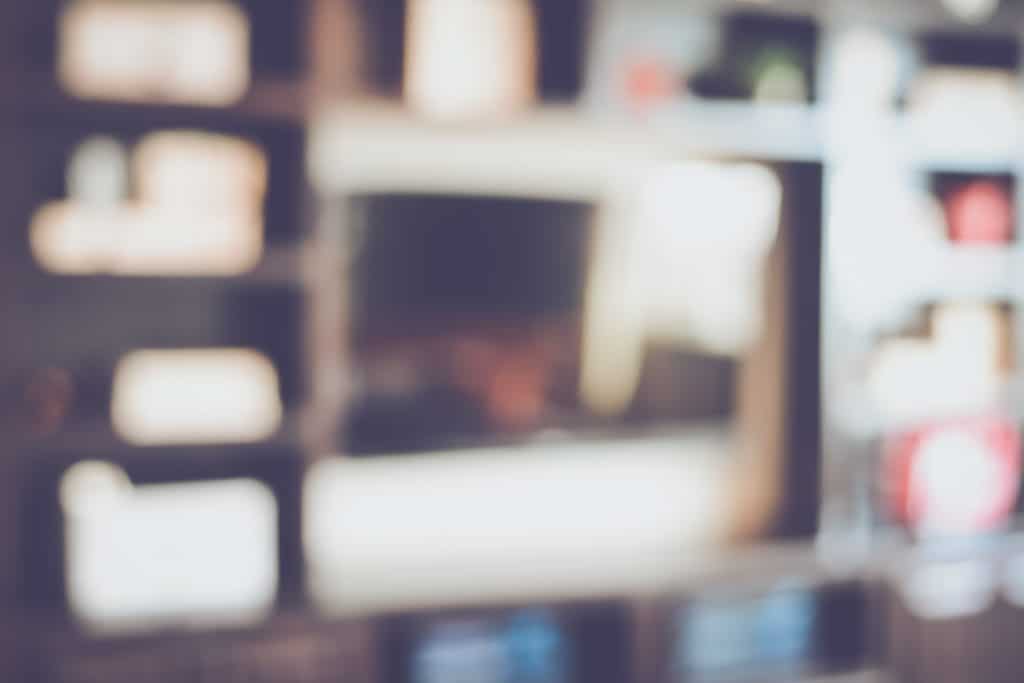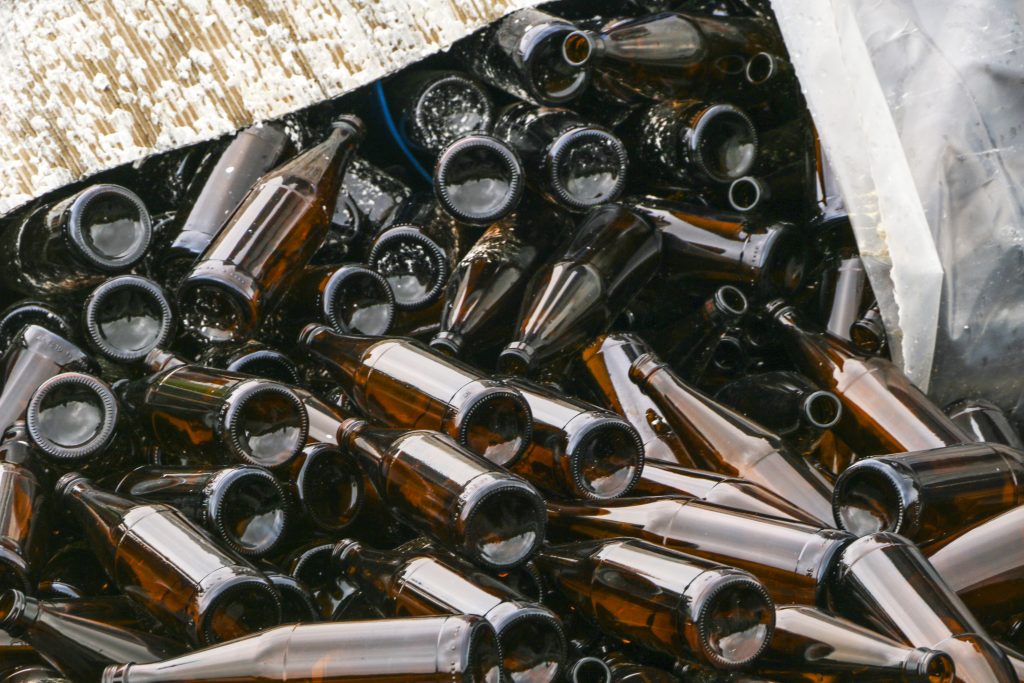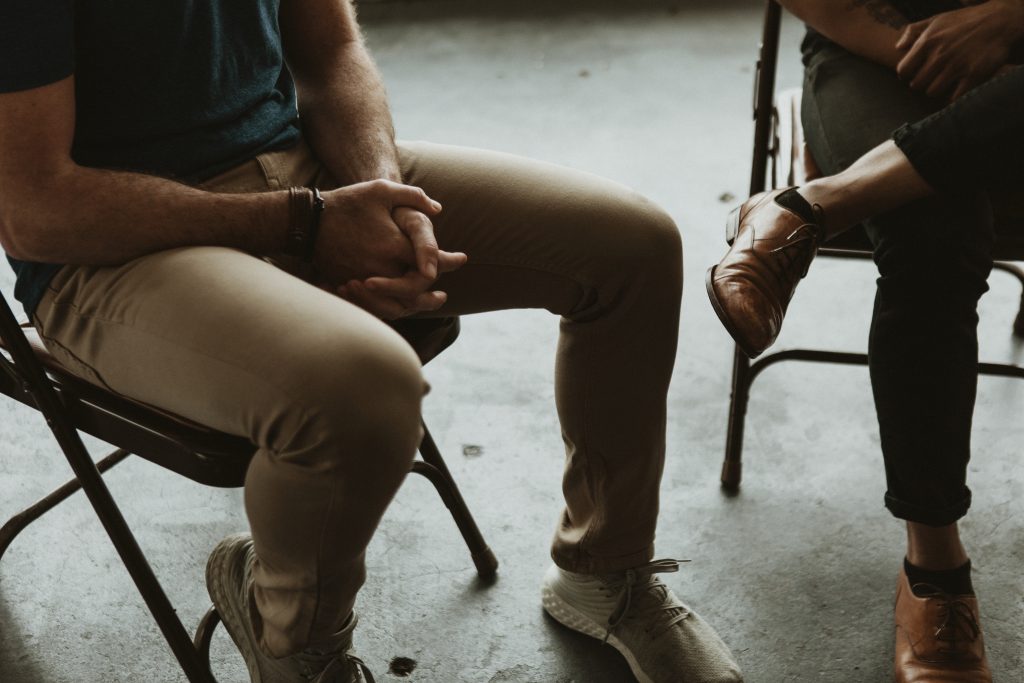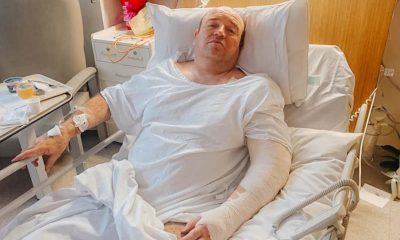#Life
Drowning In Bottles: My Muslim Story Of Addiction And Substance Use Disorder

Published
By
Karen Kaiser
I want to talk about a topic that I haven’t been able to discuss openly for most of my adult life; alcohol addiction and acute substance use disorder. I’m an African American Muslim and I grew up in the Washington, DC area. My intention is mainly to discuss my alcoholism, how it began, why I felt so secretive, and how I pulled myself out of it. I want this to be a source of strength and support for others like me who may feel hopeless or helpless in the face of such a situation.
I was addicted to alcohol. It wasn’t because I liked drinking, it’s because being drunk made me forget the things that made me sad and anxious. I drank to calm my nerves in social situations or because I didn’t know how to say ‘no.’ Or maybe because I felt I couldn’t say no. Additionally, if I became embarrassed in public or anything, drinking was my way out. Right before you lose your balance and your inhibitions, being intoxicated is like being at a carnival.
When I was drinking, my tongue was looser and my jokes funnier. I was the life of the party. I sucked up the oxygen in the room until there wasn’t anymore. And then I kept going. It’s as though my stomach was bottomless. I drank until a trapdoor opened and all the contents of my stomach dropped out onto the floor; along with the bile and my guts. It’s a painful experience. But then, so is alcoholism.
Keep supporting MuslimMatters for the sake of Allah
Alhamdulillah, we're at over 850 supporters. Help us get to 900 supporters this month. All it takes is a small gift from a reader like you to keep us going, for just $2 / month.
The Prophet (SAW) has taught us the best of deeds are those that done consistently, even if they are small. Click here to support MuslimMatters with a monthly donation of $2 per month. Set it and collect blessings from Allah (swt) for the khayr you're supporting without thinking about it.
I remember taking sips of my parents’ wine from their glasses at holiday parties as a teen, feeling like I was doing something wrong, but excited at the same time. I loved holding my father’s mugs and thinking I was as adult as he was.
He kept his liquor in a cabinet on our entertainment center, right above his records. The cabinet made a creaking sound when you opened it. The pull of alcohol was really strong. I liked how it made me feel and how it numbed my emotions. I felt ashamed that I was taking something that didn’t belong to me; something I didn’t have permission to consume. But regardless, it became a routine.

Beginning in 9th grade, I often slept through my classes, because of poor mental health and exhaustion. Even as an athlete, I felt rundown on a constant basis. I later found out I have excessive daytime sleepiness and narcolepsy. It took years of tests to receive a proper diagnosis but by then, my life had been so disrupted by sleeping that I’d become severely overwhelmed. This caused me to feel worse about myself. Though I didn’t realize it at the time, I drank as a result of how I perceived my health status. Drinking was my escape.
There were a few times where I got blackout drunk. This kind of thing started in my third year of high school. I wanted to numb my feelings and feel happy, but I’d drink too fast and too much. I’d consume alcohol until I got physically ill. Drinking like that is extremely dangerous. I realize now that I was passively suicidal and severely depressed. I was also dealing with many impulsive behaviors and had no safety net.
At my mom’s house I used to collect bottles of beer in large plastic trash bags in my room. I was ashamed for anyone to discover I was drinking, so I hid it. I’d finish a six-pack and shove the empty bottles into the bag hoping that somehow hid my ‘crime’. Eventually when the bag got too full, I’d sneak outside when no one was looking and stash it in the trash can. I got tired of that routine and I got tired of thinking people would find out. Sometimes I’d keep the bags in my room. I would hoard 3 and 4 bags of bottles at a time. I was drowning in my alcohol addiction. I couldn’t see my way out.

By college, my narcolepsy got much more debilitating. It was exacerbated by bipolar depression, anxiety and my response to trauma. I was bullied so much throughout childhood that my self-esteem suffered. No one knew how much I hated myself, and they didn’t know I had been molested and sexually assaulted at least three times in my life. My mom suspected something, but wasn’t sure who the culprit was. I couldn’t talk to my father or other family members because I was too shy and introverted; though my father was always supportive. So I drank to hide my pain.
During beach week I drank until I passed out, but before I blacked out, I went canoeing at midnight. I could have fallen overboard. I want this to be a lesson for my kids and other youth. When I woke up, there was so much vomit on my shirt and on my face. I was crying. My friends said they couldn’t stop me from getting sick and they didn’t know what to do. They tried turning me over during the night, but I still woke up on my back.
What they don’t tell you about an alcohol overdose is that it hurts. By that I mean it’s physically painful. It’s as if you can feel your cells shrinking, trying to get away from the poison of the alcohol. I’ve felt this too many times to count. When you OD or have alcohol poisoning you first feel really bad, like something is going to happen. It’s an aura, of sorts. You know you went too far with the drinking, and you wish you could take it back.
But it’s too late at that point. You feel queasy and you start sweating. You feel hot and dizzy. Your skin gets clammy too; first your hands, your upper lip, and then the rest of your skin. You start to experience a cold sweat even if you’re hot. Then your stomach starts to hurt. Like all the way at the bottom. You realize the vomiting is inevitable.
It took me two days to fully recover and sober up. My parents didn’t know where I was or who I was with. I’ve never felt that awful before. Unfortunately, even after that, I still drank. This cycle is how substance use disorder and addiction work, and it’s deadly. I went through this painful ordeal many more times in college and even afterwards, subhanAllah.
I always found a liquor store or a beer and wine place wherever I lived. I knew exactly where to go and what time they closed depending on what part of the area I was in. You become a slave to your addiction. People think you’re a low life or you’re just a bad person if you drink. They think you have poor character and that your parents raised you wrong. I hate that mentality. Addiction doesn’t discriminate. It isn’t a character issue. It’s about trauma and a lack of proper coping skills. It’s about connection, and for some of us it’s also about impulsivity and self-will. And an underlying mental illness makes things more complicated.
Religious Conversion
I was 21 years old when I converted to Islam. I felt as though I didn’t have anyone to turn to in order to share my past. I was scared that people would find out how chaotic my life had been, so I didn’t tell them anything. That left me feeling like I couldn’t trust anyone in my Muslim circles early on.
I think this was irresponsible, even if unintentional. I think I should have been counseled by a licensed therapist and Imam, screened for mental health concerns and substance use disorders, and formally welcomed to a community.Click To TweetWhen I converted, people told me to forget my old life. They said it wasn’t necessary to think about what had happened and that Allah had forgiven my past mistakes, but nobody asked me if I had any trauma, addictions,or mental health issues. I think this was irresponsible, even if unintentional. I think I should have been counseled by a licensed therapist and Imam, screened for mental health concerns and substance use disorders, and formally welcomed to a community. And furthermore, I should have been guided in what to do if I developed any of these issues subsequently. That would have been ideal anyway.
Since none of that happened, I ended up trying to quit alcohol cold turkey, several times, and trying to manage my addictions and substance use issues without professional help. I tried to hide my trauma and anxiety and was not forthcoming with clinicians when I did finally find them. This was dangerous and proved almost deadly to me on multiple occasions.
I thought quitting cold turkey was best for me and my Iman. For some reason, I thought Islam distinguished me from other addicts because I’d only ever heard of recovery from a Christian perspective.
I remember my first Ramadan when I was in college. I stopped drinking so I could pray and fast, but I didn’t have guidance, so I didn’t know how to taper and pray as a dry alcoholic. I’d go back and forth, wrestling with my alcohol addiction. I’d stopped going to parties of course, but memories of the alcohol kept attacking my psyche. I still had strong cravings and some withdrawal symptoms. It was so hard to put the bottle down, metaphorically speaking. Sometimes, I’d make a mistake and take a drink.
When I met my future husband, I’d pushed all this down and forgotten it happened. I’d repressed memories of the abuse, my visits to the psychiatrist, my sexual assaults, the alcoholism, and so on. Anything I did remember, I kept to myself out of fear of judgment and shame. We didn’t have marital counseling; in fact, it wasn’t even recommended to us. At that time, there was no counseling center at the masjid, and of course, no place to discuss addictions or alcoholism. My marriage was set up to fail, in a way.
Going Without Alcohol
The first few Ramadan’s were peaceful for me. I forgot my old life and never told anyone about my addictions. I didn’t seem to need any additional support. I was in a kind of mental health remission, but then I had my son and it triggered something in me. The stress exacerbated my symptoms and my addiction resurfaced.
I had kids back to back, every two years. The hormones and stress of being a new mother made my bipolar disorder and anxiety return with a vengeance. I developed poor coping skills as a result. I wanted to drink, but couldn’t. I wished I had told someone that I’d been a heavy drinker in college, so I’d know what to do. When my midwives asked me about alcohol and substance use, I wasn’t honest. I also didn’t remember or realize the importance of the emotional issues I was dealing with.
I found other ways to soothe my pain and anxiety. When my husband wasn’t home, if there were pills in the house, regardless if they were mine or not, I’d take them. I was right back into my addictive behaviors before I knew it. I didn’t know how to reach out for help. I realized later I was substituting one addiction for another. So quitting alcohol cold turkey, without a support system, didn’t do anything positive for me at all. I began to use my husband’s work tools to cut myself, resorting to a teenage coping mechanism I used to employ. Self-harm was something I indulged in when I needed help managing tough situations. I’d cut, scratch my face, wring my hands, wrap things around my neck, injure my limbs, or re-injure them. I did anything to feel pain or hurt myself. I still have scars on both arms.
This morning, I opened my nightstand drawers. They were a mess. I had pill bottles everywhere and drugstore receipts. I found a few loose trileptal pills (for mood regulation) too. Tops to empty bottles. Nail clippers. Trash galore. This is also a part of my addiction. It’s called hoarding and ocd. It’s a part of my ADHD and anxiety disorder, and it’s representative of my hectic life. I don’t drink anymore, but I’m disorganized. So I bought a lockbox, a pill minder, and pill pouches to organize things and it helped.
I still have a long way to go though. I don’t know how to take my meds properly, therefore my behavior still mimics addiction. I have the lockbox, but I don’t yet use it properly. I can’t figure out how to tell my doctors I need help with this entire process. I want to make a difference for others, and I wish I’d met someone like me along the way. I wish I’d been to a place like the women’s shelter I was at in Texas much sooner. What I miss about that area is someone coming to my room and asking me to go to a meeting. It was such a nice feeling.
Funny enough, when I was in Senegal, it felt much the same way. My family members would come to my door to give me attaya (Senegalese tea) or something. It’s about camaraderie and connection.
People often tell someone like me to reach out for help when we’re struggling with mental ill health or having an addiction problem. Often hotline numbers are passed around as well. This is helpful, but only to a point. The person who is in need isn’t always ready or able to ask for help when they need it the most. And the people who need to help don’t always know instinctively to reach out to their loved ones and check on them without prompting. This causes a disconnect. Maybe instead of all of us simply saying “reach out” to one another and “take care of your mental health,” we can direct these phrases and make them more meaningful. We can explain how we want people to connect with one another, that way we’re working on community building skills and creating better experiences.
They say addiction stems from a lack of connections. I’m noticing throughout my narrative, that what I’m often missing is a connection to family and friends, and a lack of a genuine connection with myself and to Allah.

When my iman is higher, I don’t want to drink or give in to my addictions. My impulse control issues, even if they do come up, are easier to manage, and I’m less apt to reject help than when my iman is lower. When I’m away from my deen, though, this isn’t the case.
It’s summertime as I’m writing this and getting pretty hot. I live close to two alcohol establishments. I don’t feel compelled to buy anything at the moment. But in the past I would have. I would have been so tempted to go grab an alcoholic beverage. I wouldn’t have been able to control my cravings. At times like this, it feels like my veins are reaching for the haram, day and night. I can feel it like I feel my heartbeat. It calls to me.
With alcohol, I’ve experienced acute intoxication, extreme drunkenness and poisoning. I don’t like to think about how many times I’ve had alcohol poisoning because my behavior was so self-sabotaging.. Hopefully now I’m taking much better care of myself. And I don’t have the need to tempt fate or see how much punishment my body can handle.
Overdosing hurts. And I’m never sure if the last time will be my “last time”. I don’t want to keep thumbing my nose at Allah’s mercy without realizing how many times I’ve been saved before.
When I notice a craving, I think back to the mindfulness steps I learned in therapy. Though a trigger can produce powerful results, I’m often able to get control quickly. Depending on where I am, I’ll sit down and meditate for a few minutes and notice my breathing and my body. I’ll sometimes close my eyes and just try to focus my attention on what may have happened to bring about the feeling of anxiety in that moment. By then, the craving has usually passed and I feel better. If not, I take steps to alleviate it. Thankfully I have a good community with whom I feel safe and comfortable and I can communicate when my needs properly. And I have a mentor who always reminds me about my prayer. This helps tremendously.
I don’t think about drinking alcohol much anymore. By this, I mean I don’t fantasize about drinking when I’m alone. But sometimes when I’m out, I do get tempted. I don’t know what to do in those moments and sometimes I get nervous. The idea of getting drunk makes my stomach turn in knots, but when I pass a liquor store, I do check to see if it’s open. If I see the window sign flashing, my heart pounds. I actually feel butterflies in my stomach. I wonder if I’ll get the urge to go inside.
I wouldn’t want people to see me walk into a liquor store as a Muslim and as a muhajjaba. So I think about altering my appearance. I’m sure people think that means I unequivocally know right from wrong, I sometimes do. But what they’re missing is the impulsivity and the compulsive disorder outside of my control, with mania and psychosis both significantly altering perception and judgment. You cannot consent to anything in those kinds of conditions.
The first khutbah I ever heard was about depression and anxiety disorder. The Imam said if you need to take medication to stabilize your brain, you should feel free to do so. I enjoyed that lesson. But I didn’t think much about it at the time. I moved on with my life as a Muslim and forgot his words of wisdom. Years later, I remembered that sermon and regretted I hadn’t taken heed much sooner. Remembering that khutbah might have saved me from heartache and turmoil.
I want others in this situation to know it’s ok to embrace your feelings and own your relationship with alcoholism. It helps me keep going when I remember Allah’s mercy and ask my friends for help. A sober network can also be helpful. My long-term goal is to be a successful mentor for those with substance use disorders in our communities, particularly the youth and anyone dealing with trauma/anxiety.
Having Islamic resources for Muslims with addiction issues is important, because faith and spirituality can connect directly with recovery. I would like people to know that alcoholism is a lifelong illness which can affect people of any age. Someone can be an occasional drinker, a binge drinker or only indulge in social settings. As Muslims we need to educate ourselves about this issue and make sure those who need support feel safe to reach out to us.
Keep supporting MuslimMatters for the sake of Allah
Alhamdulillah, we're at over 850 supporters. Help us get to 900 supporters this month. All it takes is a small gift from a reader like you to keep us going, for just $2 / month.
The Prophet (SAW) has taught us the best of deeds are those that done consistently, even if they are small. Click here to support MuslimMatters with a monthly donation of $2 per month. Set it and collect blessings from Allah (swt) for the khayr you're supporting without thinking about it.
Karen Michelle Kaiser is a native of Washington, DC. She grew up in Silver Spring, MD, where she attended elementary through high school. After college, she became a mother to three children, a blogger, and a mental health advocate.


Keeping The Faith After Loss: How To Save A Grieving Heart

Op-Ed: From Pakistan To Gaza – Why Senator Mushtaq Ahmad Khan Terrifies Power And Zionism

The Sandwich Carers: Navigating The Islamic Obligation Of Eldercare

Far Away [Part 4] – A Safe Place

Why I Can’t Leave Surah Al-Mulk Hanging Every Night

Restoring Balance In An Individualized Society: The Islamic Perspective on Parent-Child Relationships

Faith and Algorithms: From an Ethical Framework for Islamic AI to Practical Application

Far Away [Part 1] – Five Animals

The Limits Of Obedience In Marriage: A Hanafi Legal Perspective

Kuwait Strips Prominent Thinker Tariq Suwaidan Of Citizenship

[Dhul Hijjah Series] Calling Upon the Divine: The Art of Du’a (Part 1)

IOK Ramadan 2025: Four Steps | Sh Zaid Khan

IOK Ramadan 2025: Do Your Best | Sh Zaid Khan

IOK Ramadan 2025: Giving Preference to Others | Sh Zaid Khan

IOK Ramadan 2025: Which Group Are We In? | Sh Zaid Khan
Trending
-
#Islam3 weeks ago
Restoring Balance In An Individualized Society: The Islamic Perspective on Parent-Child Relationships
-
#Current Affairs1 month ago
Ahmed Al-Ahmed And The Meaning Of Courage
-
#Life1 month ago
AI And The Dajjal Consciousness: Why We Need To Value Authentic Islamic Knowledge In An Age Of Convincing Deception
-
#Culture1 month ago
Moonshot [Part 32] – FINAL CHAPTER: A Man On A Mission










Muslimah
August 18, 2020 at 8:53 AM
Jazaki Allahu khairan, Sister Karen. Your story sounds so much like my own daughter’s struggle. May Allah subhanahu wa ta’ala bless and reward you for bringing the issue of addiction within the Muslim community into the light. We need to stop the shaming and stigma around this matter, and change the culture of our families and institutions to be better prepared to recognize addiction (and sexual abuse) and provide the community resources to tackle it in the best most comprehensive way, fee Sabeel Illah. It would be good to have a national directory of Muslim addiction counselors and hotline, in sha Allah.
KS
August 18, 2020 at 11:30 AM
Thank you sister for sharing such a personal story – May Allah reward you!
I think its our duty as Muslims to take the rough situations we’ve been through and help others to prevent them from falling into the pitfalls that we have fallen into. That’s why I appreciate this article and hopefully you can be a trailblazer to help new Muslims overcome their own addictions. Also, your story brings up the need for a Therapist or counselor for new Muslims. This is an initiative as a community we should start
Wael Abdelgawad
August 18, 2020 at 2:34 PM
As-salamu alaykum sister Karen. Wow. SubhanAllah. I commend you for the tremendous courage it must have taken to tell this story so openly. InshaAllah your candidness will serve as an inspiration to others who may be going through this same problem, to let them know that they are not alone, and there is hope.
I hope you are continuing with therapy. I know from experience how liberating and affirming it can be to have someone listen without judgment. And if you have not done so already, please open up to your therapist about the childhood sexual abuse you experienced.
Thank you also to MM for publishing this story. This is the kind of groundbreaking journalism the Muslim community needs. I liked the images chosen for the post as well.
Yousra
August 21, 2020 at 9:03 AM
Thank you Karen for sharing your story. You are such a brave woman. Reading how much you struggle really touched me. And I just want to say that Allah sees your struggle too. And every time you resist temptation, a thought, or an urge He surely rewards you. You give hope to those struggling with addictions, and you also give hope to their families too. I pray that God makes obedience easy for you and shift your heart away from sin. I think it would be very useful if you take courses or read on resiliency, managing your emotions and self-regulation or meditation. My prayers to you <3
Your story inspired me to never stop trying to become better and never give up. You are so so brave.